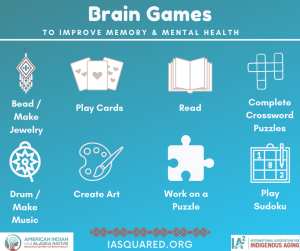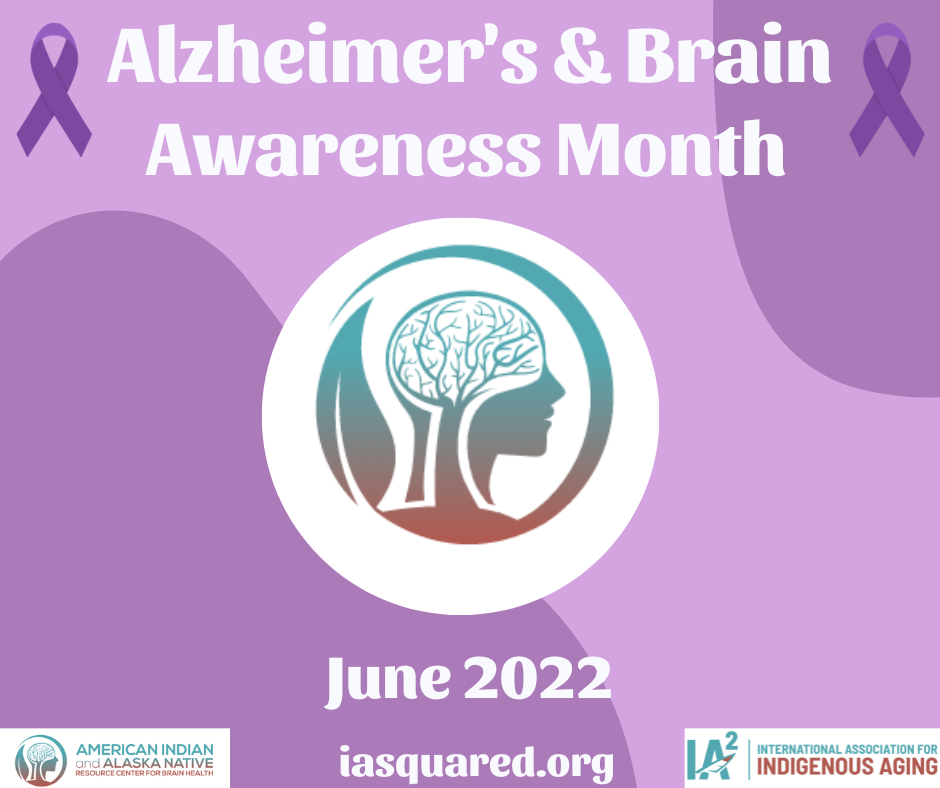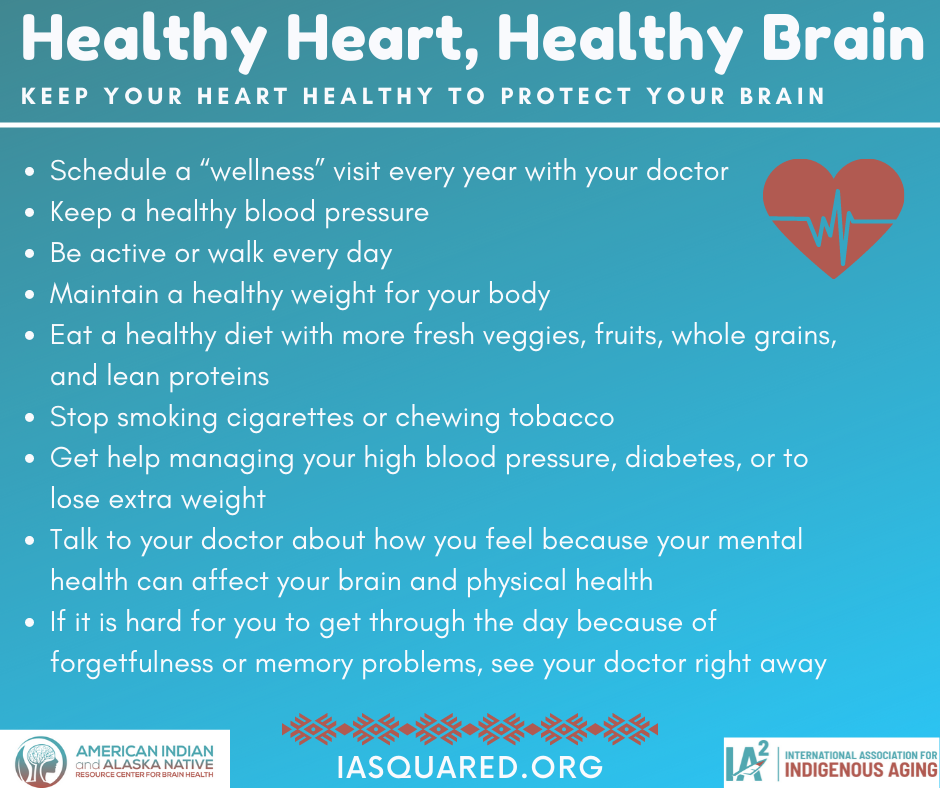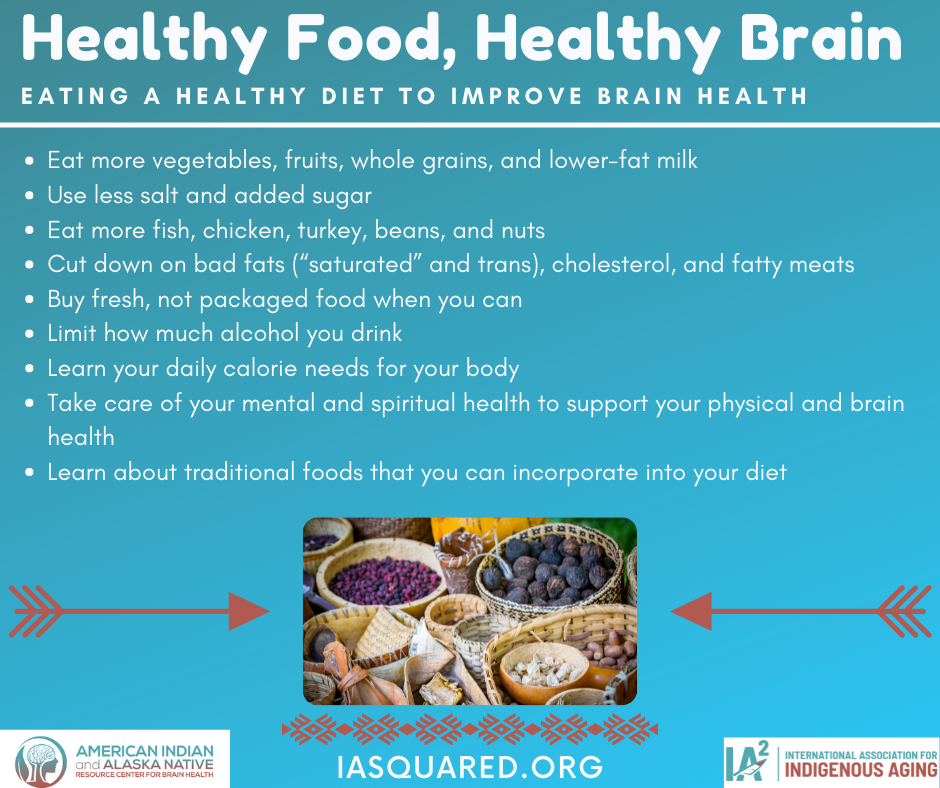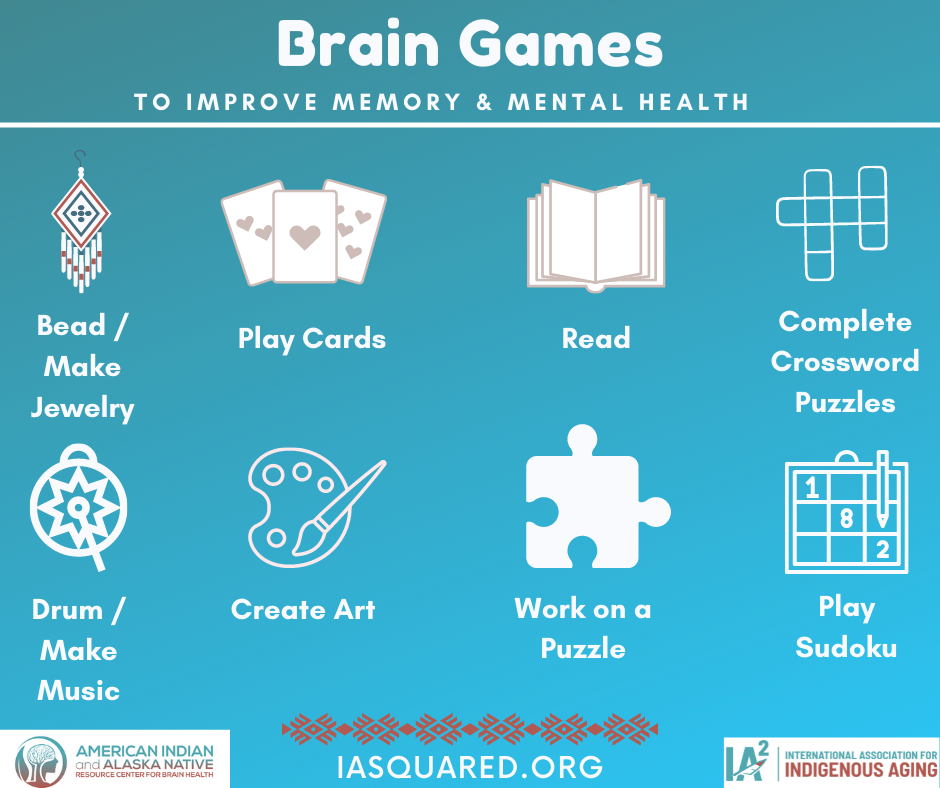June is Alzheimer’s and Brain Awareness Month! This last week of June, IA2 promotes – Healthy Lifestyle Choices for a Healthy Brain.
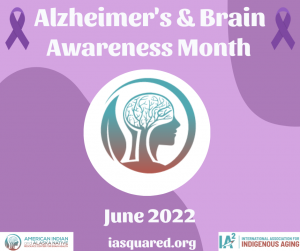
We join the mission to honor Americans living with Alzheimer’s and their families.
Everyone slows down as they get older, both in body and mind. Big changes in memory or thinking that make it hard to get through the day are not a normal part of aging. These changes could be signs of early dementia or Alzheimer’s disease.
1 in 9
People in the U.S. ages 65+ has Alzheimer’s dementia
1 in 3
American Indian people ages 65+ develops dementia
Keep Your Heart and Body Healthy to Protect Your Brain
Heart health is important in keeping Alzheimer’s and dementia at bay. Minimizing the risk factors of cardiovascular disease can help prevent damage to the brain.
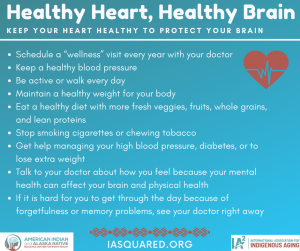
You are more at risk of developing dementia if you have:
- high blood pressure
- diabetes or
- you smoke cigarettes
You can help protect your body, heart, and mind by doing some of these things:
- Schedule a “wellness” visit and health screenings every year with your doctor, even if you feel ok
- Keep a healthy blood pressure
- Be active or walk every day
- Maintain a healthy weight for your body size
- Eat a healthier diet with more fresh vegetables, fruits, whole grains, and fish
- Stop smoking cigarettes or chewing tobacco
- Get help managing your high blood pressure, diabetes, or to lose extra weight
- Talk to your doctor about how you feel because your mental health can affect your brain and physical health
- If it is hard for you to get through the day because of forgetfulness or memory problems, see your doctor right away
You can do these things today to protect your mind and reduce the risk of or slow down dementia.
Working with Your Doctor
- Make an appointment for a “wellness” checkup with your doctor every year
- You will get tests and screenings to make sure you are healthy
- They are usually free with Medicare Part B or the Indian Health Service
- If you have concerns about your memory, talk to your doctor
- Have your blood pressure checked and know your numbers
- Your blood pressure should be less than 120/80 mmHg (120 over 80)
- If you do not know how to take your blood pressure, ask your doctor to show you
- Have your weight checked regularly and know your number. If you need to lose extra weight, ask your doctor about:
- The right number of calories for your body
- Ideas for healthier food choices
- Support for losing weight
- If you smoke cigarettes or chew tobacco, ask about medicine, counseling, or help to stop
- If you do not have diabetes, have your blood sugar level checked during your visit. Your blood sugar should be less than 100 mg/dL when you have not eaten.
- If you do have diabetes, go to regular doctor visits. Have your blood sugar and “A1C” levels checked. Your doctor will tell you what your A1C level should be.
- Talk with your doctor about all the medicines and vitamins you take. Your doctor can make sure they do not cause any problems with your memory, sleep, or brain function.
Other Steps You Can Take
- Aim for 20 minutes of physical activity a day or 2 1/2 hours a week
- Eat less salt, sugar, red meat, and highly processed or packaged foods
- Read food labels to see how much salt (sodium) or fat is in your food
- Manage extra weight by making small changes. Losing a few pounds makes a difference
- Limit alcohol. No more than 1 drink per day for women and 2 for men
- Take your medicine for blood pressure, diabetes, and other problems even if you feel good
- Get at least seven hours of sleep each night. Talk to your doctor if you have trouble sleeping
- Keep your mind active. Visit with people in your community, help plan tribal events, go to your senior center, teach your language, play cards, or start a new hobby.
Eating a Healthy Diet to Improve Brain Health
Food & drink are a source of strength and connection to community. A return to traditional food pathways and eating local, seasonal fresh foods make healthier eating easier.
Healthier steps to protect your brain:
- Eat more vegetables, fruits, whole grains, and lower-fat milk
- Use less salt and added sugar
- Eat more fish, chicken, turkey, beans, and nuts
- Cut down on bad fats (“saturated” and trans), cholesterol, and red meat
- Buy fresh, not packaged food when you can
- Limit how much alcohol you drink
- Learn your daily calorie needs for your body
- Take care of your mental and spiritual health to support your physical and brain health
- Learn about traditional foods that you can incorporate into your diet
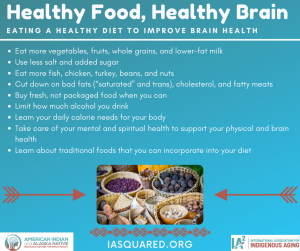
Small changes can make a big difference for better brain health.
Brain Games to Improve Memory and Mental Health
Consider the following activities to support your own memory and mental health
- Beading or jewelry making
- Drumming / making music
- Complete crossword puzzles
- Create art
- Read
- Work on a puzzle
- Play cards
- Play sudoku
